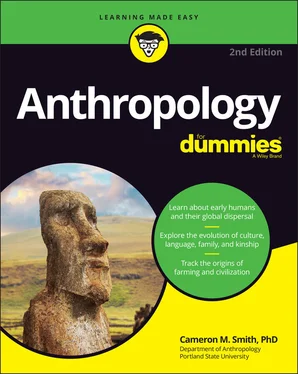1 ...6 7 8 10 11 12 ...25 Early anthropology has many roots, and some were in the efforts of Western civilization to better understand the lands and peoples it was colonizing. This isn’t revisionist history or Western-civilization bashing — it’s just plain fact.
For example, in 1902 the Report of the Philippine Commission stated that “Since the first arrival of the Portuguese in Eastern waters, the mind of the Malay has appeared to the European as a closed book. Both races have ever misunderstood and mistrusted each other. Out of mutual ignorance and fear have followed hatred, oppression, and retaliation … this government is attempting to rear a new standard of relationship between the white man and the Malay. The success … will depend … on our correct understanding and scientific grasp of the peoples whose problems we are facing.”
The problems the report refers to were Western problems revolving around how to make better workers of the Malaysians, and the solution was a scientific understanding of these folk to be achieved through the new science of anthropology. Specifically, this new science would use one of its principal tools, ethnography, to help the colonial effort. Ethnography is the direct observation of a group of people by living near or among them, and making records of what one observes.
HARSH WORDS FOR EARLY ANTHROPOLOGY
Although Europeans began to substantially colonize the New World and other “discoveries” in the 17th century, the colonialist endeavor wasn’t fully realized and backed up by industrialization until the 19th century. Early ethnographies — documents describing non-European cultures authored by people who lived for some time on those cultures — were often little more than intelligence reports for use in exploitation.
In 1966, Claude Levi-Strauss, a leading anthropologist of his time, wrote that cultural anthropology and ethnography were rooted in a historical context in which “… the larger part of mankind [was made] subservient to the other, and during which millions of innocent human beings have had their resources plundered and their institutions and beliefs destroyed, whilst they themselves were ruthlessly killed, thrown into bondage, and contaminated by diseases they were unable to resist.”
This kind of study is hardly surprising today, but keep in mind that for a long time, knowledge of what went on in non-Western cultures wasn’t based on direct experience but on superficial reports from outsiders. These reports often judged — with Western civilization’s basic biblical approach — what had been observed. This was a common error that took decades to overturn, so anthropology could understand each culture in its own unique context.
Colonialist ethnographies had some distinctive characteristics:
Racism: Particularly, the idea that non-Western people were inferior to Westerners and therefore had to be educated to the best of the colonial powers’ ability (but would always remain inferior to Westerners).
Social Darwinism: Particularly, the idea that non-Western people either were destined to be Westernized (in which case they should be helped to achieve Westernization — for example, by having their customs banned and replaced with Western customs) or were doomed to extinction (in which case not much could be done for them but to document them like living museum exhibits before they became extinct).
Ethnocentrism: The idea that Western civilization was at the pinnacle of human evolution, and that all other ways of life were inferior; note that this view isn’t exclusive to Western civilization — many cultures worldwide believe it as well.
Although early anthropology was colored by its involvement with colonialism, by the 1950s many anthropologists recognized that ethnographies being produced under the colonialist paradigm weren’t as objective as they could be, and they began to question the old concept of clear-cut races; in 1969, the American Anthropological Association formed a Committee on Ethics. By the mid-1970s, guidelines for ethical ethnography were being published, and today graduate students undergo ethical and human-relations training before doing fieldwork.
 Federally funded anthropological research by U.S. researchers normally requires a review and approval by the government’s Institutional Review Board to ensure that “human subjects research” doesn’t harm the very people it’s researching.
Federally funded anthropological research by U.S. researchers normally requires a review and approval by the government’s Institutional Review Board to ensure that “human subjects research” doesn’t harm the very people it’s researching.
Although anthropologists still must consider plenty of ethical issues when doing research among other human beings, I’m confident that most ethnographic anthropologists today don’t work for colonialist efforts or efforts counter to the interest of the people they study. In fact, my impression is that most ethnographers today do the opposite: They work in the interest of the folks they study. This approach can have its own pitfalls, if the researcher glorifies the people she’s studying, so remaining an impartial, scientific observer is a constant challenge. At the same time, most anthropologists — in one way or another — are working to answer some of the basic questions we looked at in the section “ Getting to the Heart of Anthropology” earlier in this chapter.
You can find the roots of archaeology (the branch of anthropology studying the ancient past) in a distinctly nonscientific interest in the past. Many motivations initially drove this antiquarian (prescientific) interest. For example, ancient Sumerian royalty commissioned excavations that could show their connections to mythical culture heroes. In another example, 16th-century French traders could sell curios (unusual articles, often ancient ones of mysterious function) to royal families across Europe, and 19th-century eligible English bachelors could clutter their parlors with artifacts meant to demonstrate their owners’ high education and interest in the esoteric. Having a “cabinet of curiosities” full of ancient objects (pottery, flint axes, and so on) was a great way to get ahead socially, because it was evidence of your wealth and the fact that you had the luxury of time to study. Only in the 1850s did appreciable numbers of investigators — who began to call themselves archaeologists — start to carefully document what they excavated, treating artifacts not just for their monetary or social value, but for their scientific value.
OLE WURM AND THE CIRCUS STRONGMAN
The roots of modern scientific archaeology are in Europe, where, from the 1650s to the 1850s, all manner of men (yes, it was mostly men for a long time) sought to find and bring home antiquities and curios of the ancient world. This checkered crew included genuine naturalists, such as Danish prehistorian Ole Wurm, legions of vaguely interested wealthy British bachelors, and Giovanni Belzoni, the Italian-born charlatan, circus strongman, and explorer of the Egyptian pyramids.
Wurm (1588–1654) was a Danish professor of medicine with an interest in, well, everything. Paying students to collect objects and curios any time they traveled abroad, Wurm assembled an impressive collection of artifacts, skeletons, fossils, rocks, ancient statuary, artifacts, and other bric-a-brac. Working under the impression that the world was just a few thousand years old, Wurm organized the objects in his museum not according to age (as we would today), but by how much they resembled one another. This was a start at systematically organizing the many new objects being discovered by explorers, but it was different from today’s archaeology because it lacked an understanding of the actual age of the Earth and humanity.
Читать дальше

 Federally funded anthropological research by U.S. researchers normally requires a review and approval by the government’s Institutional Review Board to ensure that “human subjects research” doesn’t harm the very people it’s researching.
Federally funded anthropological research by U.S. researchers normally requires a review and approval by the government’s Institutional Review Board to ensure that “human subjects research” doesn’t harm the very people it’s researching.










